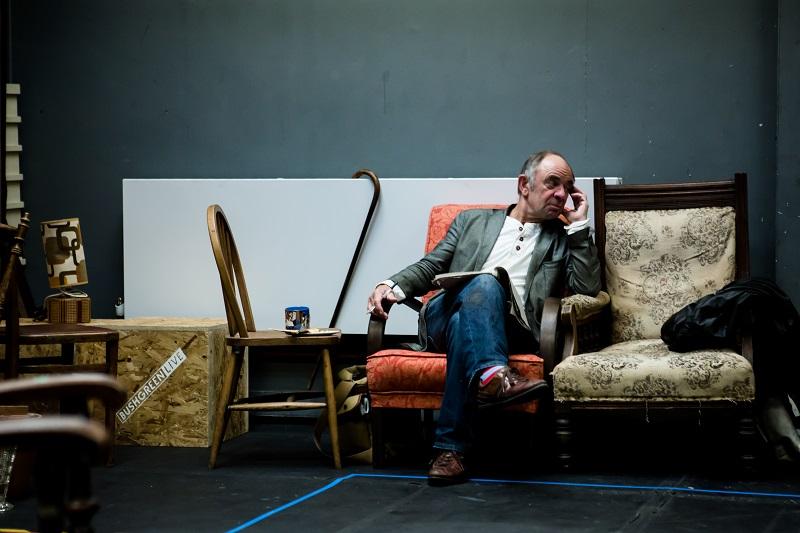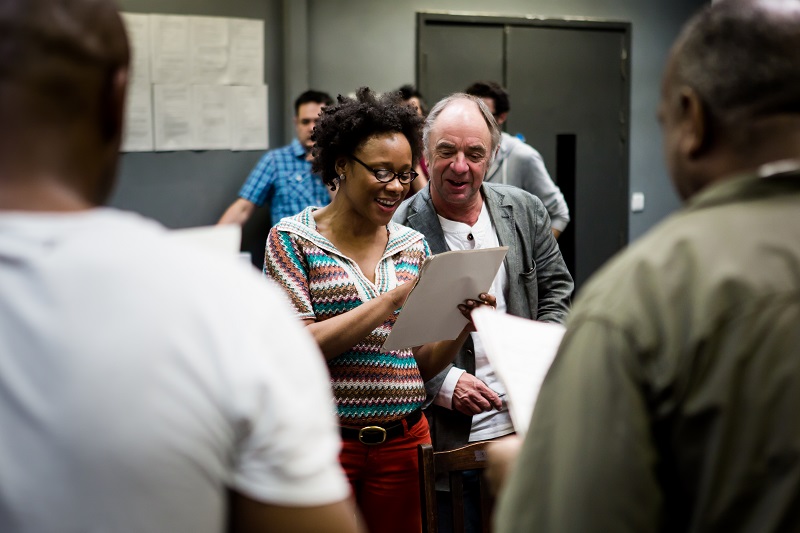First Person: Gotta Have Faith? | reviews, news & interviews
First Person: Gotta Have Faith?
First Person: Gotta Have Faith?
Playwright Robin Soans introduces his drama about a family divided by faith

A still Sunday morning in late October… the sky monotone grey… my friend and I are on a fact-finding mission in Jackson, Mississippi. We drive to the outskirts of the city, take a left onto Hanging Moss Road, and see ahead of us, in isolation among the pines, the Word and Worship church where Bishop Jeffrey Stallworth will be conducting morning service.
The two most vivid memories of that service were the preaching, which struck me as being retrogressive and unenlightening: if something goes wrong, if you meet oppression and racial inequality, don’t unite in trying to fix it, thank the Lord it isn’t worse, put up and shut up, and you will get your reward in the next world. On the other hand the combination of the prayer and music - the music was truly soul-stirring - inspired that congregation to leave the church with fresh courage, and a determination to cope with whatever life threw at them.
Moral outrage has been devalued, because everyone cites it as the springboard for their actions
It was this apparent contradiction that set me thinking about the clash of ideas centred round the issue of faith, and when I met a man in London whose family had been split apart by difference of religious opinion or lack of it, I had found the means of expressing these ideas in dramatic form. I am not interested in taking sides. One thing I have learned over years of writing plays on contentious issues is that, for it to be worthwhile, you have to write as well for the people whose views you find offensive as the people who broadly espouse the same opinion as your own. What really interests me is when people with opposing but valid reasons for their actions meet head on. The resulting car crash spawns matters for debate.
Perseverance Drive is not a verbatim play, but it is as meticulously researched and detailed as my other plays. I try to avoid going into a new area with preconceived ideas or a fixed agenda… people will constantly surprise you, and like all of us, be a mass of contradictions. In paddling around in that mess of vulnerability we may learn something about the complexity of the human condition and, hopefully, be set thinking in a more liberal fashion about issues that appear one-sided.
 We in the United Kingdom live in one of the most secular societies in the world, and many of us cite religion, or organised religion, as being the cause of contention, violence, and an excuse for atrocious behaviour. Moral outrage as a currency has been devalued, because everyone cites it as the springboard for their actions, whether berating the extremists for their carnage, or big business and politicians for their retaliation, which usually comes in the form of blatant empire building. In both cases faith is viewed with cynicism, as it is clearly only a thin veneer of righteousness covering a thick block of political, personal or economic ambition. And scriptures which were written thousands of years ago are given a convenient interpretation to justify actions in the modern world.
We in the United Kingdom live in one of the most secular societies in the world, and many of us cite religion, or organised religion, as being the cause of contention, violence, and an excuse for atrocious behaviour. Moral outrage as a currency has been devalued, because everyone cites it as the springboard for their actions, whether berating the extremists for their carnage, or big business and politicians for their retaliation, which usually comes in the form of blatant empire building. In both cases faith is viewed with cynicism, as it is clearly only a thin veneer of righteousness covering a thick block of political, personal or economic ambition. And scriptures which were written thousands of years ago are given a convenient interpretation to justify actions in the modern world.
Meanwhile our home-grown religious movements are seen as flabby and ineffectual, spending more time in internal debate on the role of women and homosexuals in the church than actually doing anything about spreading the word of Christ in a meaningful fashion. The church comes across as a place of respectability as opposed to morality, where the militancy of Christ’s preaching has got lost in a welter of flower arranging, brass rubbing, and polishing of pews, and sits like an obedient poodle at the heels of the establishment.
All these ideas are swilling about in my mind, but you can’t plonk them down on the page. You have to find a metaphor, and my metaphor is a rolling family saga with its attendant humour and drama where these issues lurk like predatory fish just below the surface, and will hopefully cause the audience to leave the theatre with a little more understanding of the place of faith in our society than when they arrived.
Share this article
The future of Arts Journalism
You can stop theartsdesk.com closing!
We urgently need financing to survive. Our fundraising drive has thus far raised £49,000 but we need to reach £100,000 or we will be forced to close. Please contribute here: https://gofund.me/c3f6033d
And if you can forward this information to anyone who might assist, we’d be grateful.

Subscribe to theartsdesk.com
Thank you for continuing to read our work on theartsdesk.com. For unlimited access to every article in its entirety, including our archive of more than 15,000 pieces, we're asking for £5 per month or £40 per year. We feel it's a very good deal, and hope you do too.
To take a subscription now simply click here.
And if you're looking for that extra gift for a friend or family member, why not treat them to a theartsdesk.com gift subscription?
more Theatre
 Hedda, Orange Tree Theatre review - a monument reimagined, perhaps even improved
Scandinavian masterpiece transplanted into a London reeling from the ravages of war
Hedda, Orange Tree Theatre review - a monument reimagined, perhaps even improved
Scandinavian masterpiece transplanted into a London reeling from the ravages of war
 The Assembled Parties, Hampstead review - a rarity, a well-made play delivered straight
Witty but poignant tribute to the strength of family ties as all around disintegrates
The Assembled Parties, Hampstead review - a rarity, a well-made play delivered straight
Witty but poignant tribute to the strength of family ties as all around disintegrates
 Mary Page Marlowe, Old Vic review - a starry portrait of a splintered life
Tracy Letts's Off Broadway play makes a shimmeringly powerful London debut
Mary Page Marlowe, Old Vic review - a starry portrait of a splintered life
Tracy Letts's Off Broadway play makes a shimmeringly powerful London debut
 Little Brother, Soho Theatre review - light, bright but emotionally true
This Verity Bargate Award-winning dramedy is entertaining as well as thought provoking
Little Brother, Soho Theatre review - light, bright but emotionally true
This Verity Bargate Award-winning dramedy is entertaining as well as thought provoking
 The Unbelievers, Royal Court Theatre - grimly compelling, powerfully performed
Nick Payne's new play is amongst his best
The Unbelievers, Royal Court Theatre - grimly compelling, powerfully performed
Nick Payne's new play is amongst his best
 The Maids, Donmar Warehouse review - vibrant cast lost in a spectacular-looking fever dream
Kip Williams revises Genet, with little gained in the update except eye-popping visuals
The Maids, Donmar Warehouse review - vibrant cast lost in a spectacular-looking fever dream
Kip Williams revises Genet, with little gained in the update except eye-popping visuals
 Ragdoll, Jermyn Street Theatre review - compelling and emotionally truthful
Katherine Moar returns with a Patty Hearst-inspired follow up to her debut hit 'Farm Hall'
Ragdoll, Jermyn Street Theatre review - compelling and emotionally truthful
Katherine Moar returns with a Patty Hearst-inspired follow up to her debut hit 'Farm Hall'
 Troilus and Cressida, Globe Theatre review - a 'problem play' with added problems
Raucous and carnivalesque, but also ugly and incomprehensible
Troilus and Cressida, Globe Theatre review - a 'problem play' with added problems
Raucous and carnivalesque, but also ugly and incomprehensible
 Clarkston, Trafalgar Theatre review - two lads on a road to nowhere
Netflix star, Joe Locke, is the selling point of a production that needs one
Clarkston, Trafalgar Theatre review - two lads on a road to nowhere
Netflix star, Joe Locke, is the selling point of a production that needs one
 Ghost Stories, Peacock Theatre review - spirited staging but short on scares
Impressive spectacle saves an ageing show in an unsuitable venue
Ghost Stories, Peacock Theatre review - spirited staging but short on scares
Impressive spectacle saves an ageing show in an unsuitable venue
 Hamlet, National Theatre review - turning tragedy to comedy is no joke
Hiran Abeyeskera’s childlike prince falls flat in a mixed production
Hamlet, National Theatre review - turning tragedy to comedy is no joke
Hiran Abeyeskera’s childlike prince falls flat in a mixed production
 Rohtko, Barbican review - postmodern meditation on fake and authentic art is less than the sum of its parts
Łukasz Twarkowski's production dazzles without illuminating
Rohtko, Barbican review - postmodern meditation on fake and authentic art is less than the sum of its parts
Łukasz Twarkowski's production dazzles without illuminating

Add comment